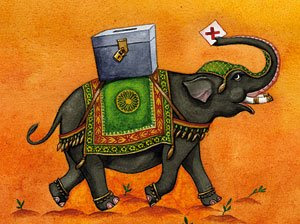This is as much as I could glean, as reported by the AFP:
During the programme, Radio Rwanda said, former prime minister Faustin Twagiramungu, who now lives in exile in Belgium, said that as a Hutu, he could never give in to Tutsi demands to apologize for the 1994 genocide.
The government had this to say of the situation:
"We have suspended all BBC programmes in Kinyarwanda because they had become a real poison with regards to the reconciliation of the Rwandan people," Information Minister Louise Mushikiwabo told AFP.
"We could no longer tolerate that," she said. "The Rwandan government shall protest strongly, until the BBC can give us guarantees of responsible journalism."
The editorial in Rwanda's New Times comes down hard on both the BBC and the international community, concluding:
Even as we prepare to celebrate World Press Freedom Day, under the broader theme to do with the role of media in national reconciliation, the behavior by the BBC in Rwanda leaves us with much to ponder on.
Rwanda has every right to take exception when her history and efforts at moving on through reconciliation are insulted. Just like any other country reserves that right.
In Germany those who deny the Holocaust face judicial processes. Dutch politician Geert Wilder was banned in London and indicted in Holland for his radical anti-Islam views.
As I have mentioned before, those who discuss Rwanda are often polarized, either adoring or despising the government of Paul Kagame, and I think both sides are too quick to judge. Whether the response of the government in this case was an overreaction is impossible to debate (much less determine) without knowing what was being said on that particular show, and without fully understanding the social and political climate in Rwanda today.Michael Keating of World Politics Review says the sheen has come off Kagame. Human Rights Watch demands Rwanda restore the BBC to air, saying:
"This suspension of the BBC reflects the Rwandan government's growing crackdown on free speech," said Georgette Gagnon, Africa director at Human Rights Watch. "If Rwanda is truly committed to the fundamental right of free expression, it should allow differing viewpoints on genocide issues and related government policies."
Meanwhile, just to demonstrate the degree of this polarization, on the adoring side we have Pastor Rick Warren, who has just nominated Paul Kagame as one of TIME magazine's 100 Most Influential People, gushing:
Kagame's leadership includes a number of uncommon characteristics: One is his willingness to listen and learn from to those who oppose him, and even find ways to partner with them.
When Stephen Kinzer was writing a biography of Kagame, the president gave him a list of his critics and suggested that Kinzer could discover what the president was really like by interviewing them. Only a humble, yet confident, leader would do that.
Another uncommon characteristic is Kagame's zero tolerance for corruption. Rwanda is one of few countries where I've never been asked for a bribe. Anytime a government worker is caught in corruption, he is publicly exposed and dealt with. It is a model for the entire country - and the rest of the world too.
So the debate continues...

